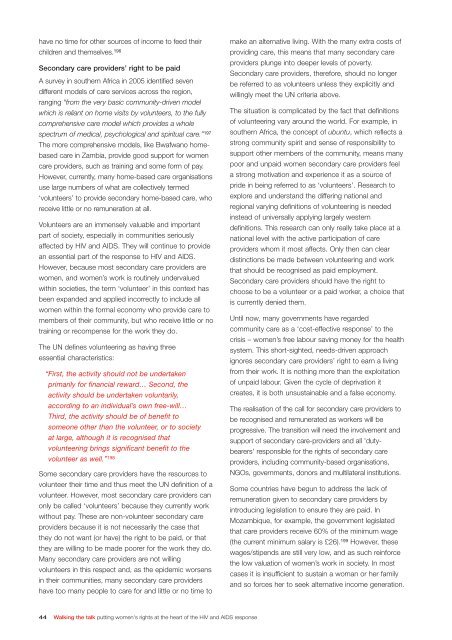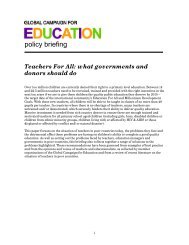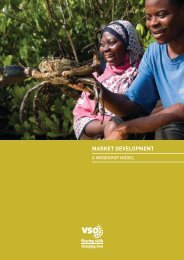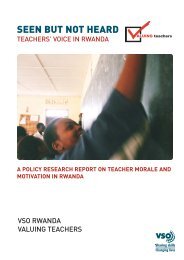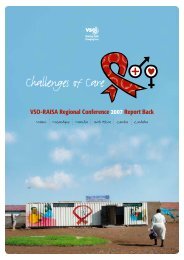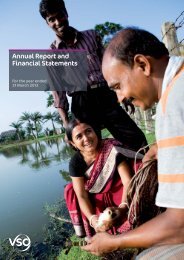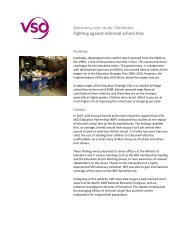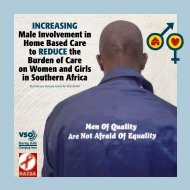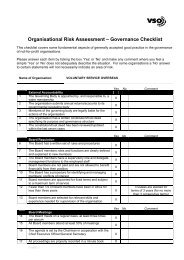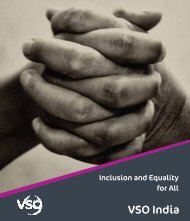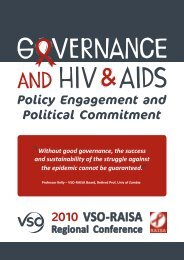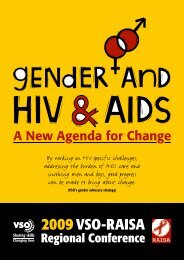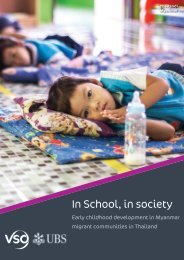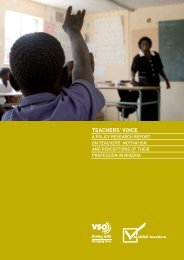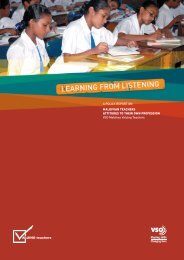Walking the Talk - VSO
Walking the Talk - VSO
Walking the Talk - VSO
You also want an ePaper? Increase the reach of your titles
YUMPU automatically turns print PDFs into web optimized ePapers that Google loves.
have no time for o<strong>the</strong>r sources of income to feed <strong>the</strong>irchildren and <strong>the</strong>mselves. 196Secondary care providers’ right to be paidA survey in sou<strong>the</strong>rn Africa in 2005 identified sevendifferent models of care services across <strong>the</strong> region,ranging “from <strong>the</strong> very basic community-driven modelwhich is reliant on home visits by volunteers, to <strong>the</strong> fullycomprehensive care model which provides a wholespectrum of medical, psychological and spiritual care.” 197The more comprehensive models, like Bwafwano homebasedcare in Zambia, provide good support for womencare providers, such as training and some form of pay.However, currently, many home-based care organisationsuse large numbers of what are collectively termed‘volunteers’ to provide secondary home-based care, whoreceive little or no remuneration at all.Volunteers are an immensely valuable and importantpart of society, especially in communities seriouslyaffected by HIV and AIDS. They will continue to providean essential part of <strong>the</strong> response to HIV and AIDS.However, because most secondary care providers arewomen, and women’s work is routinely undervaluedwithin societies, <strong>the</strong> term ‘volunteer’ in this context hasbeen expanded and applied incorrectly to include allwomen within <strong>the</strong> formal economy who provide care tomembers of <strong>the</strong>ir community, but who receive little or notraining or recompense for <strong>the</strong> work <strong>the</strong>y do.The UN defines volunteering as having threeessential characteristics:“First, <strong>the</strong> activity should not be undertakenprimarily for financial reward… Second, <strong>the</strong>activity should be undertaken voluntarily,according to an individual’s own free-will…Third, <strong>the</strong> activity should be of benefit tosomeone o<strong>the</strong>r than <strong>the</strong> volunteer, or to societyat large, although it is recognised thatvolunteering brings significant benefit to <strong>the</strong>volunteer as well.” 198Some secondary care providers have <strong>the</strong> resources tovolunteer <strong>the</strong>ir time and thus meet <strong>the</strong> UN definition of avolunteer. However, most secondary care providers canonly be called ‘volunteers’ because <strong>the</strong>y currently workwithout pay. These are non-volunteer secondary careproviders because it is not necessarily <strong>the</strong> case that<strong>the</strong>y do not want (or have) <strong>the</strong> right to be paid, or that<strong>the</strong>y are willing to be made poorer for <strong>the</strong> work <strong>the</strong>y do.Many secondary care providers are not willingvolunteers in this respect and, as <strong>the</strong> epidemic worsensin <strong>the</strong>ir communities, many secondary care providershave too many people to care for and little or no time tomake an alternative living. With <strong>the</strong> many extra costs ofproviding care, this means that many secondary careproviders plunge into deeper levels of poverty.Secondary care providers, <strong>the</strong>refore, should no longerbe referred to as volunteers unless <strong>the</strong>y explicitly andwillingly meet <strong>the</strong> UN criteria above.The situation is complicated by <strong>the</strong> fact that definitionsof volunteering vary around <strong>the</strong> world. For example, insou<strong>the</strong>rn Africa, <strong>the</strong> concept of ubuntu, which reflects astrong community spirit and sense of responsibility tosupport o<strong>the</strong>r members of <strong>the</strong> community, means manypoor and unpaid women secondary care providers feela strong motivation and experience it as a source ofpride in being referred to as ‘volunteers’. Research toexplore and understand <strong>the</strong> differing national andregional varying definitions of volunteering is neededinstead of universally applying largely westerndefinitions. This research can only really take place at anational level with <strong>the</strong> active participation of careproviders whom it most affects. Only <strong>the</strong>n can cleardistinctions be made between volunteering and workthat should be recognised as paid employment.Secondary care providers should have <strong>the</strong> right tochoose to be a volunteer or a paid worker, a choice thatis currently denied <strong>the</strong>m.Until now, many governments have regardedcommunity care as a ‘cost-effective response’ to <strong>the</strong>crisis – women’s free labour saving money for <strong>the</strong> healthsystem. This short-sighted, needs-driven approachignores secondary care providers’ right to earn a livingfrom <strong>the</strong>ir work. It is nothing more than <strong>the</strong> exploitationof unpaid labour. Given <strong>the</strong> cycle of deprivation itcreates, it is both unsustainable and a false economy.The realisation of <strong>the</strong> call for secondary care providers tobe recognised and remunerated as workers will beprogressive. The transition will need <strong>the</strong> involvement andsupport of secondary care-providers and all 'dutybearers'responsible for <strong>the</strong> rights of secondary careproviders, including community-based organisations,NGOs, governments, donors and multilateral institutions.Some countries have begun to address <strong>the</strong> lack ofremuneration given to secondary care providers byintroducing legislation to ensure <strong>the</strong>y are paid. InMozambique, for example, <strong>the</strong> government legislatedthat care providers receive 60% of <strong>the</strong> minimum wage(<strong>the</strong> current minimum salary is £26). 199 However, <strong>the</strong>sewages/stipends are still very low, and as such reinforce<strong>the</strong> low valuation of women’s work in society. In mostcases it is insufficient to sustain a woman or her familyand so forces her to seek alternative income generation.44 <strong>Walking</strong> <strong>the</strong> talk putting women's rights at <strong>the</strong> heart of <strong>the</strong> HIV and AIDS response


